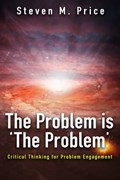Those of us in contemporary society, are besieged by a multitude of ideas, opinions, facts, and a relentless onslaught of stimulation. Our ability to navigate all that we perceive and process is being challenged daily. For the most part, each of us, in our own way, has devised mechanisms to cope and adapt.
The Problem Is The Problem describes why the problems spawned from the complex systems of society has outstripped the reasoning and rationale of science and policy. In doing so, all of us must realize there is a distinct need to think critically, more diligently about these problems and their outcomes.
Critical thinking is difficult to characterize. Actually, critical, as in ‘critique’, is the critical examination or review of the merits of a subject, position, or theory as a reflection of contemporary society. Examples might include social issues, conservative politics, or public policy. Invariably, almost anything that forces us to evaluate and judge has potential to be ‘a problem’.
The larger problems of society, the complex systems problems, are insoluble. Consequently, we do not solve these problems, we design solutions based upon how we define and evaluate the problem situation as presented. Thus, it is problem engagement, not problem solving, that becomes the focus of critical thinking.

